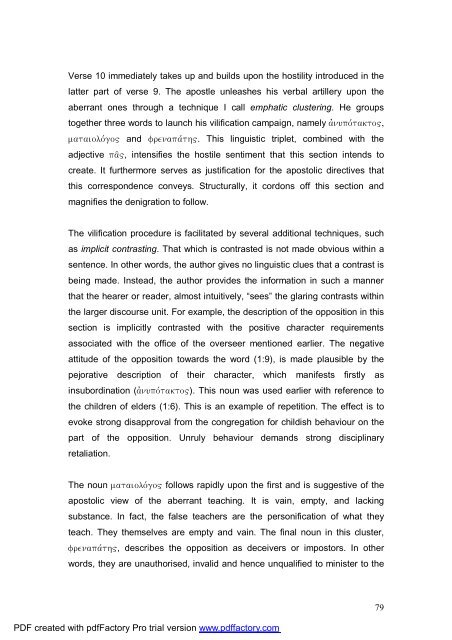A Text centred rhetorical analysis of Paul's Letter to Titus
A Text centred rhetorical analysis of Paul's Letter to Titus
A Text centred rhetorical analysis of Paul's Letter to Titus
Create successful ePaper yourself
Turn your PDF publications into a flip-book with our unique Google optimized e-Paper software.
Verse 10 immediately takes up and builds upon the hostility introduced in the<br />
latter part <strong>of</strong> verse 9. The apostle unleashes his verbal artillery upon the<br />
aberrant ones through a technique I call emphatic clustering. He groups<br />
<strong>to</strong>gether three words <strong>to</strong> launch his vilification campaign, namely ajnupovtak<strong>to</strong>~,<br />
mataiolovgo~ and frenapavth~. This linguistic triplet, combined with the<br />
adjective pa`~, intensifies the hostile sentiment that this section intends <strong>to</strong><br />
create. It furthermore serves as justification for the apos<strong>to</strong>lic directives that<br />
this correspondence conveys. Structurally, it cordons <strong>of</strong>f this section and<br />
magnifies the denigration <strong>to</strong> follow.<br />
The vilification procedure is facilitated by several additional techniques, such<br />
as implicit contrasting. That which is contrasted is not made obvious within a<br />
sentence. In other words, the author gives no linguistic clues that a contrast is<br />
being made. Instead, the author provides the information in such a manner<br />
that the hearer or reader, almost intuitively, “sees” the glaring contrasts within<br />
the larger discourse unit. For example, the description <strong>of</strong> the opposition in this<br />
section is implicitly contrasted with the positive character requirements<br />
associated with the <strong>of</strong>fice <strong>of</strong> the overseer mentioned earlier. The negative<br />
attitude <strong>of</strong> the opposition <strong>to</strong>wards the word (1:9), is made plausible by the<br />
pejorative description <strong>of</strong> their character, which manifests firstly as<br />
insubordination (ajnupovtak<strong>to</strong>~). This noun was used earlier with reference <strong>to</strong><br />
the children <strong>of</strong> elders (1:6). This is an example <strong>of</strong> repetition. The effect is <strong>to</strong><br />
evoke strong disapproval from the congregation for childish behaviour on the<br />
part <strong>of</strong> the opposition. Unruly behaviour demands strong disciplinary<br />
retaliation.<br />
The noun mataiolovgo~ follows rapidly upon the first and is suggestive <strong>of</strong> the<br />
apos<strong>to</strong>lic view <strong>of</strong> the aberrant teaching. It is vain, empty, and lacking<br />
substance. In fact, the false teachers are the personification <strong>of</strong> what they<br />
teach. They themselves are empty and vain. The final noun in this cluster,<br />
frenapavth~, describes the opposition as deceivers or impos<strong>to</strong>rs. In other<br />
words, they are unauthorised, invalid and hence unqualified <strong>to</strong> minister <strong>to</strong> the<br />
PDF created with pdfFac<strong>to</strong>ry Pro trial version www.pdffac<strong>to</strong>ry.com<br />
79

















